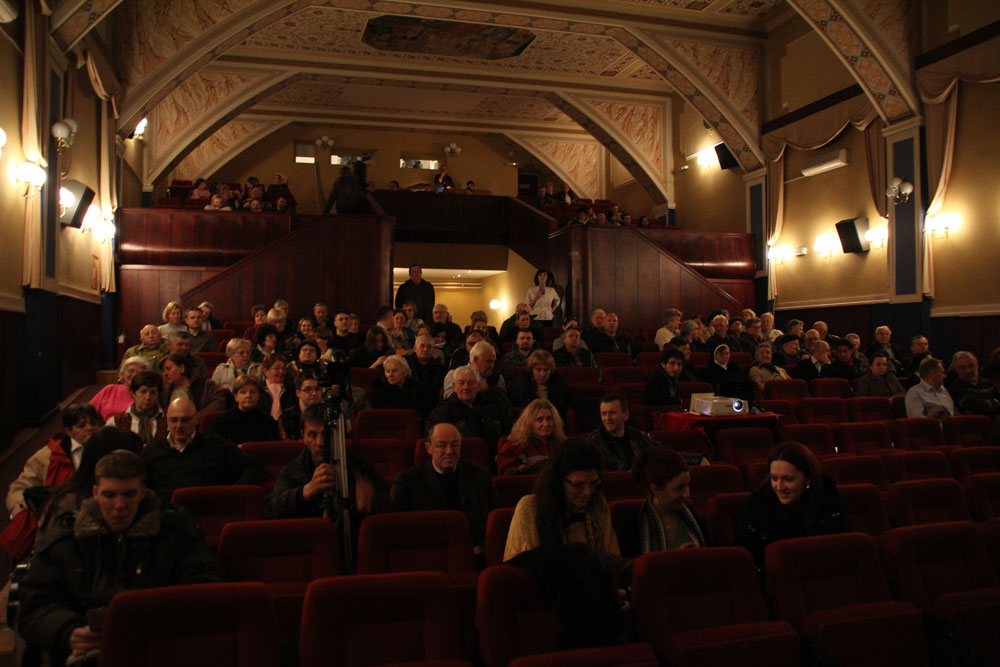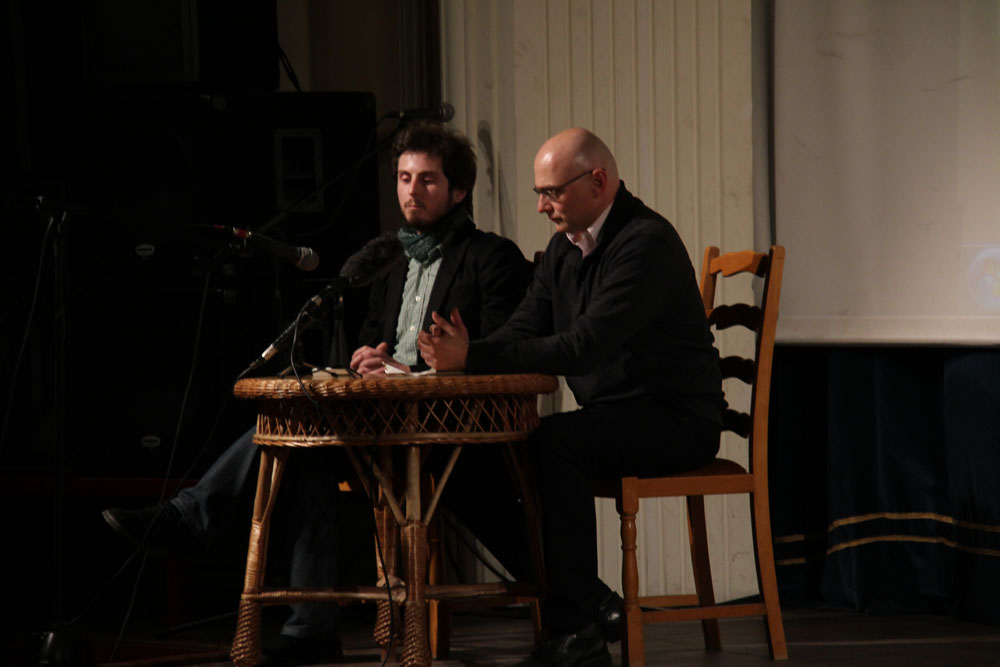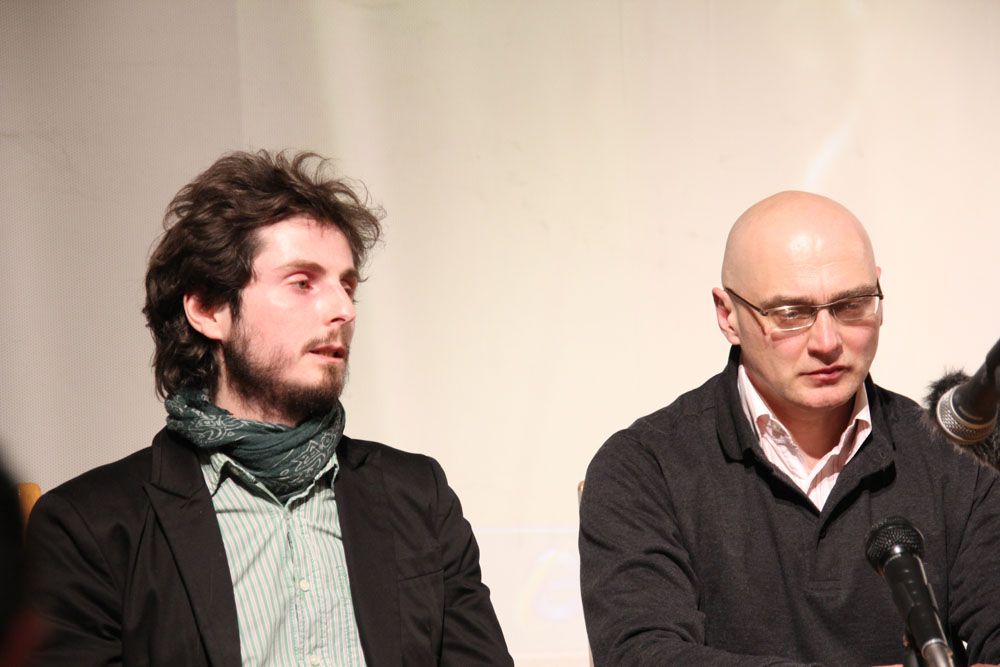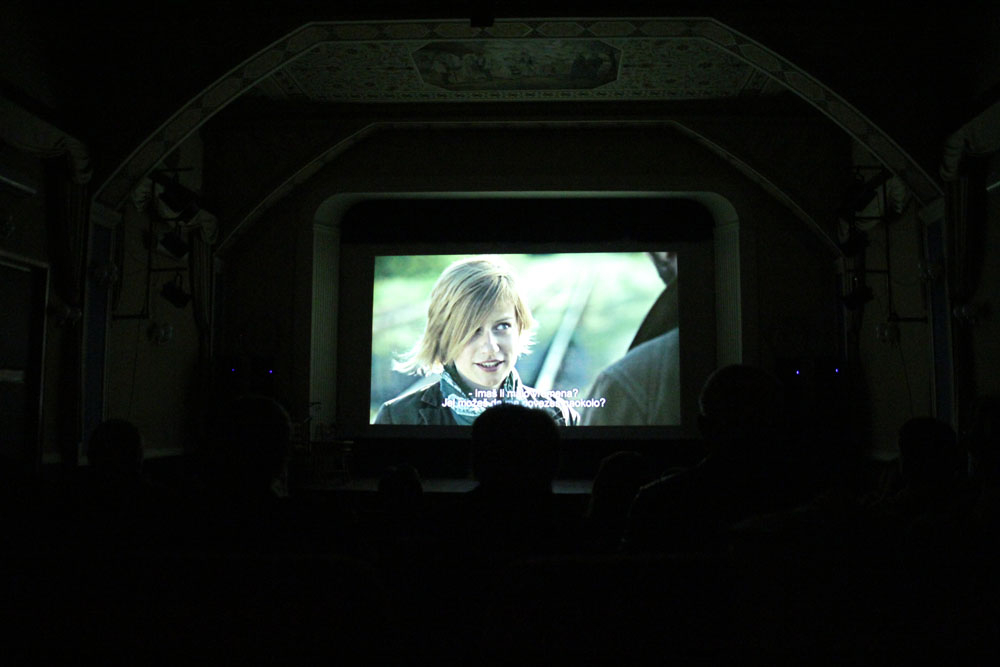“Den Studenten zeigen” - Erfolgreicher Auftakt der Film-Tour in Apatin (15. 3. 2012)
“Ich denke, es war ein großer Tag für den Film ‘Die Donauschwaben’”, zeigte sich Regisseur Marko Cvejic nach der Auftaktveranstaltung der Film-Tour durch die Vojvodina am 15. März 2012 in Apatin sehr zufrieden. Über 150 Besucher hatten sich im Kulturzentrum eingefunden und im Anschluss an die Filmpräsentation den Ausführungen von Boris Mašić vom deutschen Kulturverein “Adam Berenc” in Apatin und dem Regisseur gelauscht. Die Reaktionen waren sehr positiv. Besonders erfreulich waren die Wortmeldungen zweier Professoren, die darum baten, ihren Studenten den Film zeigen zu dürfen. Zur Veranstaltung waren Vertreter der meisten lokalen Medien erschienen wie 025info, Radio Apatin, TV Apatin und Radio Danube.

Kulturzentrum Apatin - Foto: Visnja Cupic Jovanovic
U četvrtak, 15. marta 2012. godine, u Kulturnom centru Apatin, održana je prva projekcija filma “Podunavske Švabe” u okviru turneje koja će trajati tokom marta i aprila. Projekciji je prisustvovalo oko 150 posetilaca iz lokalne zajednice. Na panel diskusiji koja je usledila nakon projekcije, govorili su Boris Mašić, lokalni partner i osnivač nemačkog udruženja Adam Berenc, i Marko Cvejić, reditelj i scenarista filma.
Novinar Teofil Pančić, koji je bio najavljen kao govornik za ovu panel diskusiju, bio je sprečen da prisustvuje iz zdravstvenih razloga, ali je verovatno da će učestvovati u nekoj od narednih projekcija u okviru vojvođanske turneje.
U okviru panel diskusije bilo je govora o motivaciji reditelja da se bavi istraživanjem stradanja nemačkog naroda u Vojvodini nakon Drugog svetskog rata, za vreme komunističkog režima, pitanjem kolektivne krivice kroz diskurs paralele između posleratne Nemačke i savremene Srbije.

Regisseur Marko Cvejic (links) und Boris Masic (deutscher Kulturverein “Adam Berenc”) im Gespräch - Foto: Visnja Cupic Jovanovic
Evo šta su izjavili neki od gledalaca u okviru panela:
“Ja sam oduševljen ovim filmom, ali sam posebno oduševljen jednom stvari: u filmu nemamo podelu prema stranačkoj, verskoj ili nacionalnoj osnovi. Imamo podelu na huligane i one koji žele nešto da nauče. Taj film ima jako lepu poruku, ali ga je video mali broj ljudi. Dok god imamo te podele mi ćemo imati problema. Mi moramo da se izborimo sa tim, kao ljudi. “
“Nisu svi ljudi bili uz Hitlera, i podržavali tu politiku. Nadamo se da je ovo prilika da se otvoreno govori o našoj zajedničkoj istoriji. Svakako da je ovaj film izazvao puno emocija. Generalna poruka ovog filma je topla, ljudska, da se to nikad nikome više ne dogodi. Na žalost, mi smo bili svedoci ponavljanja istorije, i nadamo se da se ovakva istorija nikada nikome neće ponoviti - nikome, bez obzira na naciju, religiju. To je prava poruka ovog filma. “
“Kao profesorka, verujem da se đaci mogu veoma zainteresovati, ako im se ova tema prikaže na adekvatan način. Volela bih da prikažem ovaj film u školi đacima, nadam se da ćete mi to omogućiti. “
“Ja lično pozdravljam vas mlade, što ste imali tu snagu da prikažete ovaj film, da mladi ljudi vide i drugu stranu, a ne samo jednostrano viđenje istorije. Da oni sami presude - ovo je dobro, ovo nije dobro. “
Događaju je prisustvovala većina lokalnih medija, 025info, Radio Apatin, TV Apatin i radio Dunav.

Regisseur Marko Cvejic (links) und Boris Masic auf dem Podium - Foto: Visnja Cupic Jovanovic
On Thursday, 15th March 2012, in the Cultural Centre of Apatin, a first screening of the film “Danube Swabians” was held. More than 150 people were present at the screening. At the panel discussion that followed the screenings, Boris Mašić, lokal partner from German association “Adam Berenc”, and Marko Cvejić, director and screenwriter were talking.
Teofil Pančić, journalist, who was announced as a speaker on this panel discussion, was unable to attend because of health reasons, but most likely he will participate in one of the next screenings.
Some of the topics in the panel discussion were: motivation of director to research the sufferings of the German people in Vojvodina after the Second World War, during the communist regime, and the question of collective guilt through discourse and parallels between post-war Germany and contemporary Serbia.

Maria Schneider (Zala Vidali) auf der Suche nach dem Haus ihres donauschwäbischen Großvaters - Foto: Visnja Cupic Jovanovic
Here’s what some of the spectators said in the panel:
“I am delighted with this film, but I am especially happy with one thing: in the film we don’t make division on the party, religious or ethnic background. We can divide the hooligans and those who want to learn something. This film has a very nice message, but not enough people have seen it. As long as we have divisions we will have problems. We need to deal with it, as people.”
“Not all the people were with Hitler, and supported his politics. We hope that this is an opportunity to openly talk about our common history. Certainly, this film caused a lot of emotion. General message of this film is warm and human; that it never again happens to anyone. Unfortunately, we were witnessing history repeating, and we hope that this history will never repeat to anyone, regardless of nationality and religion. This is the true message of this film.”
“As a professor, I believe it can be very interesting for students, if this topic is present to them adequately. I would like to show this film to the students in school, I hope you will allow me to.”
“I personally welcome you young, for having the strength to show this movie, for young people to see the other side, not just one-sided view of history, and give them a chance to make their own judgment - this is good, this is not good.”
The event was attended by most of the local media, 025info, Radio Apatin, TV Apatin and Radio Danube.
2012-03-16